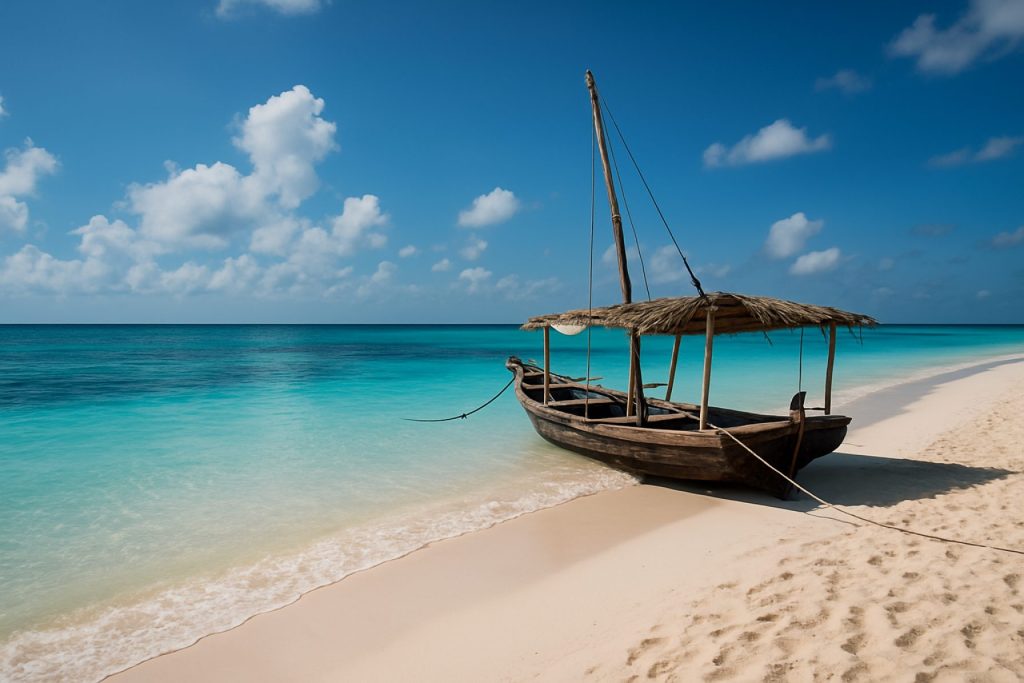
Zanzibar Travel Guide 2024: Insider Tips, Must-Sees & Essential Info
- Visa Hacks & Entry Rules: What You Need Before You Fly
- When to Go: Zanzibar’s Secret Seasons Revealed
- Must-See Marvels: Top 10 Zanzibar Attractions You Can’t Miss
- Perfect Itinerary: 5, 7 & 10-Day Zanzibar Plans for Every Traveler
- Stay in Style: Best Hotels, Beach Resorts & Unique Stays
- Eat Like a Local: Zanzibar’s Best Food Spots & Dishes
- Getting Around: Transport Tips for Smooth Island Hopping
- Safety First: Health, Scams & Staying Secure in Zanzibar
- Hidden Gems: Offbeat Zanzibar Adventures Few Know About
- Budget Breakdown: What a Zanzibar Trip Really Costs in 2024
Visa Hacks & Entry Rules: What You Need Before You Fly
Zanzibar, a semi-autonomous region of Tanzania, welcomes travelers with relatively straightforward entry requirements. Here’s what you need to know to ensure a smooth arrival.
- Visa Requirements: Most travelers, including citizens from the US, UK, EU, Canada, and Australia, require a visa to enter Zanzibar. You can obtain a Tanzania eVisa online before departure, which is recommended to avoid queues, or get a visa on arrival at the airport.
- eVisa Application: The eVisa process is straightforward and typically takes 10 days. Apply via the official Tanzanian government site, upload a passport photo, a copy of your passport, and pay the fee (usually $50 for a single entry tourist visa).
- Visa on Arrival: If you opt for a visa on arrival, bring cash (USD preferred, crisp bills from 2009 or newer) and expect some waiting time at immigration.
- Passport Validity: Your passport must be valid for at least six months from your arrival date and have at least one blank page for the visa stamp.
- Yellow Fever Certificate: If you are arriving from, or have transited through, a country with risk of yellow fever transmission, you must present a valid yellow fever vaccination certificate upon entry.
- Return Ticket & Accommodation Proof: Immigration officers may ask for proof of onward travel and confirmed accommodation, so have these ready (digital copies are accepted).
- COVID-19 Regulations: As of 2024, COVID-19 testing and vaccine proof are not required for entry, but check for updates prior to travel via the Tanzania Tourism Board or your airline.
- Local Entry Fees: Some hotels and resorts may collect a local infrastructure tax (usually $1–$4 per person, per night), payable in cash.
- Prohibited Items: Zanzibar has strict laws against plastic bags—bring eco-friendly alternatives. Drones require advance permission.
For the latest travel advice, always consult the Tanzania Tourism Board and your local embassy before your trip.
When to Go: Zanzibar’s Secret Seasons Revealed
When to Go: Zanzibar’s Secret Seasons Revealed
Zanzibar’s tropical climate makes it an appealing destination year-round, but knowing its seasons can help you plan the perfect trip:
- High Season (June to October): Known for its dry weather, balmy temperatures (average 25-28°C), and clear skies, this is the prime time for beachgoers and divers. It coincides with European summer holidays, so expect higher prices and more crowds on popular beaches like Nungwi and Kendwa.
- Short Rainy Season (November to mid-December): Brief afternoon showers break up sunny spells. This “secret season” sees fewer tourists, meaning quieter beaches and better deals on accommodation. The rains rarely disrupt activities, making it a favorite for savvy travelers.
- Festive Peak (mid-December to January): Christmas and New Year attract holidaymakers. Advance bookings are essential if visiting during this period.
- Green Season (March to May): Zanzibar’s main rainy period brings lush landscapes and dramatic skies. Many resorts offer discounts, though some close for renovations. Rain tends to fall in heavy bursts, often leaving mornings or late afternoons clear for exploration.
-
Secret Tips:
- For diving, visibility is best between July and September, and again in February-March.
- Spice tours and cultural festivals (like the Zanzibar Tourism’s Sauti za Busara music festival in February) are less crowded and more immersive in shoulder months.
- Book ferries and flights early if traveling during high season or major holidays.
Whatever season you choose, Zanzibar offers a blend of culture, adventure, and relaxation—just tailor your visit to match your interests and weather preferences.
Must-See Marvels: Top 10 Zanzibar Attractions You Can’t Miss
Zanzibar dazzles with its unique blend of Swahili, Arab, and colonial influences, offering travelers a rich tapestry of cultural and natural attractions. Here are the top 10 must-see marvels for your Zanzibar adventure:
- Stone Town: A UNESCO World Heritage site, Stone Town brims with history, maze-like alleys, bustling bazaars, and ornate doorways. Don’t miss the Old Fort and House of Wonders. Guided walking tours are recommended for first-timers (Zanzibar Tourism).
- Prison Island (Changuu): A short boat ride from Stone Town, this historic island is famous for its giant Aldabra tortoises and crystal-clear waters, perfect for snorkeling.
- Nungwi Beach: Famed for powdery white sand and turquoise water, Nungwi offers lively beach bars, water sports, and sunset cruises.
- Jozani Chwaka Bay National Park: The only national park on Zanzibar, home to the rare red colobus monkey and lush mangrove forests. Early morning is best for wildlife sightings.
- Spice Farms: Take a guided “spice tour” to learn about Zanzibar’s aromatic heritage and sample fresh cloves, nutmeg, and vanilla.
- Kendwa Beach: Known for its wide, tide-independent beach and vibrant nightlife, Kendwa is ideal for swimming at any time of day.
- The Rock Restaurant: A world-famous eatery perched atop a rock in the ocean near Michamvi, accessible by foot at low tide or boat at high tide. Reservations are highly recommended.
- Mnemba Atoll: Renowned for diving and snorkeling, Mnemba’s coral reefs teem with marine life, including dolphins and colorful fish. Book trips through reputable operators.
- Forodhani Gardens: Stone Town’s lively night market is a must for street food enthusiasts—try Zanzibar pizza, grilled seafood, and sugarcane juice.
- Palace Museum (Beit al-Sahel): Once home to the Sultan of Zanzibar, this museum houses fascinating exhibits on royal history and Swahili culture.
For up-to-date entry requirements, transport tips, and event calendars, consult the official Zanzibar Tourism website. Plan ahead for high season (June–October and December–February) and book accommodations early for the best rates.
Perfect Itinerary: 5, 7 & 10-Day Zanzibar Plans for Every Traveler
Perfect Itinerary: 5, 7 & 10-Day Zanzibar Plans for Every Traveler
Whether you have five, seven, or ten days to explore Zanzibar, the spice island offers a blend of history, beaches, culture, and adventure. Here are sample itineraries tailored for each trip length, with tips to make the most of your stay.
-
Day 1: Arrival in Stone Town
- Land at Abeid Amani Karume International Airport (ZNZ) and transfer to your accommodation.
- Stroll through UNESCO-listed Stone Town’s narrow alleys. Key sights: Forodhani Gardens, House of Wonders, Old Fort.
- Sample local cuisine at a rooftop restaurant.
-
Day 2: Stone Town & Prison Island
- Visit the Old Slave Market and Anglican Cathedral.
- Take a boat to Prison Island to see giant tortoises and snorkel.
5-Day Itinerary
- Day 3: Northern Beaches (Nungwi or Kendwa)
- Transfer to Nungwi or Kendwa (about 1.5 hours by taxi or shuttle).
- Enjoy white sand beaches and turquoise waters. Water activities: snorkeling, diving, sunset dhow cruise.
- Day 4: More Beach Time & Local Culture
- Visit a local fishing village, try turtle conservation experiences, or join a cooking class.
- Day 5: Spice Tour & Departure
- En route to the airport, join a guided spice farm tour to learn about Zanzibar’s spice heritage.
7-Day Itinerary
- Days 1-4: Follow the 5-day plan above.
- Day 5: Mnemba Atoll Excursion
- Take a snorkeling or diving trip to Mnemba Atoll, famous for marine life and clear waters.
- Day 6: East Coast Relaxation (Paje/Jambiani)
- Transfer to Paje or Jambiani. Enjoy kite surfing, paddle boarding, or relax at beach cafés.
- Day 7: Jozani Forest & Departure
- Visit Jozani Chwaka Bay National Park to spot rare red colobus monkeys before heading to the airport.
10-Day Itinerary
- Days 1-7: Follow the 7-day itinerary above.
- Day 8: Michamvi Peninsula
- Spend a day on the quieter beaches of Michamvi. Try The Rock Restaurant for a unique dining experience.
- Day 9: Cultural Experiences
- Explore Makunduchi for traditional Swahili culture, or visit local markets for crafts.
- Day 10: Leisure & Departure
- Enjoy your last morning at leisure. Shop for spices, art, or textiles before departure.
Travel Tips
- Transport: Private taxis are reliable; shared dala-dala minibuses are budget-friendly but less comfortable.
- Best Time to Visit: June to October (dry season) offers the best weather. March to May is rainy.
- Currency: Tanzanian Shilling (TZS) is widely used; some hotels accept USD.
- Safety: Zanzibar is generally safe, but take usual precautions with valuables in busy areas.
- Entry Requirements: Most travelers need a Tanzanian visa, available online or on arrival. Check updates at the Tanzania Immigration site.
- Official Tourism Info: For up-to-date travel advice, see the Zanzibar Commission for Tourism.
With beautiful beaches, a rich history, and abundant adventure, Zanzibar is a vibrant destination easily explored in 5, 7, or 10 days.
Stay in Style: Best Hotels, Beach Resorts & Unique Stays
Zanzibar, an Indian Ocean archipelago off the coast of Tanzania, offers a vibrant mix of historic charm, white-sand beaches, and unique accommodations. Whether you seek luxurious resorts, boutique hotels, or distinctive stays, Zanzibar has an option for every traveler.
-
Luxury Beach Resorts:
- Baraza Resort & Spa – Located on the southeast coast, this all-villa resort is known for its Swahili-inspired architecture, private plunge pools, and award-winning spa.
- The Residence Zanzibar – Set on 32 hectares of tropical gardens, this five-star resort offers private villas with pools, extensive water sports, and a kids club.
- Park Hyatt Zanzibar – Overlooking Stone Town’s seafront, this luxury hotel blends contemporary comfort with heritage, offering easy access to historic sites and local markets.
-
Boutique & Unique Hotels:
- Emerson Spice Hotel – Situated in the heart of Stone Town, this restored merchant’s house features individually themed rooms and a renowned rooftop restaurant.
- Upendo Beach Zanzibar – A chic, small-scale resort in Michamvi, ideal for couples seeking privacy, designer interiors, and stunning ocean views.
- Kisiwa House – A historic boutique hotel in Stone Town, perfect for those seeking Swahili elegance and personalized service.
-
Unique Stays:
- The Manta Resort – Located on Pemba Island, this eco-friendly resort features the world-famous Underwater Room, offering a surreal marine sleeping experience.
- Zanzibar White Sand Luxury Villas & Spa – Known for its eco-conscious design and private luxury villas set among lush gardens and beachfront.
- Chumbe Island Coral Park – A private island eco-lodge with sustainable bungalows, ideal for nature lovers and snorkelers.
-
Booking & Travel Tips:
- Book well in advance, especially during peak seasons (June–October, December–February).
- Many resorts offer airport transfers; confirm when booking.
- Consider location—Stone Town for culture and history, Nungwi and Kendwa for lively beaches, Michamvi and Paje for tranquility.
- Many hotels are cashless or accept major credit cards, but carrying some Tanzanian Shillings (TZS) is useful for smaller establishments.
- Check for inclusions like half-board, full-board, or all-inclusive packages.
-
Official Resources:
- For official accommodation listings and travel updates, visit the Zanzibar Commission for Tourism.
- For visa and travel advisories, refer to the Tanzania Tourist Board.
Eat Like a Local: Zanzibar’s Best Food Spots & Dishes
Zanzibar is a food lover’s paradise, famed for its fusion of African, Arab, Indian, and European flavors. The archipelago’s cuisine is a direct reflection of its rich history as a trading hub. Here’s how to eat like a local and savor the island’s best culinary experiences:
-
Must-Try Dishes:
- Zanzibar Pizza: A unique street food resembling a stuffed crepe, filled with meats, vegetables, eggs, and sometimes cheese or Nutella, cooked on a flat griddle.
- Urojo Soup (Zanzibar Mix): A tangy, spicy soup made from flour, potatoes, fried cassava, bhajias, boiled eggs, and topped with crispy bits.
- Pilau: Aromatic rice cooked with spices, meat, and sometimes vegetables—a staple at celebrations.
- Octopus Curry (Pweza wa nazi): Tender octopus simmered in creamy coconut sauce with local spices.
- Samaki wa Kupaka: Grilled fish slathered with coconut sauce, usually served with rice or chapati.
- Mishkaki: Grilled meat skewers, marinated in spices, widely available at roadside grills and markets.
- Mandazi: Swahili doughnuts—slightly sweet, deep-fried, and perfect with chai.
-
Top Local Food Spots:
- Forodhani Gardens Night Market (Stone Town): The island’s most famous street food market. Come after sunset for fresh seafood skewers, Zanzibar pizza, sugarcane juice, and sweet treats.
- Lukmaan Restaurant (Stone Town): A local favorite for authentic Zanzibari home-style cooking. Try pilau, biryani, and coconut curries.
- Mercury’s Restaurant (Stone Town): Named after Freddie Mercury (born in Zanzibar), this spot offers seafood and local specialties with a seafront view.
- Passing Show Hotel (Stone Town): Known for affordable, tasty Swahili dishes in a casual setting.
- 6 Degrees South (Stone Town): Great for a mix of local and international flavors, with rooftop views.
- Street Food Stalls: Throughout Stone Town and coastal villages, you’ll find vendors selling mishkaki, fresh fruit, and fried snacks.
-
Foodie Tips:
- Most local dishes are halal. Pork is rarely served, and alcohol is mainly available at hotels and tourist restaurants.
- Try a Spice Tour to see Zanzibar’s famous cloves, nutmeg, cinnamon, and learn how they flavor local dishes.
- Markets and street food operate mostly in cash (Tanzanian Shilling). Credit cards are accepted at larger restaurants and hotels.
- Vegetarians can enjoy chapati, beans, vegetable curries, and fresh tropical fruits.
- For a special experience, book a table at The Rock Restaurant on Michamvi Pingwe beach, famed for its unique setting and fresh seafood.
-
Useful Resources:
- For official tourist information, see the Zanzibar Commission for Tourism.
- For up-to-date health and food safety tips, consult the World Health Organization.
Getting Around: Transport Tips for Smooth Island Hopping
Zanzibar offers a variety of transport options for travelers looking to explore both Unguja (the main island) and its surrounding islets. From budget-friendly local transport to private transfers and inter-island ferries, getting around is relatively straightforward with some planning.
- Dala-dalas: These shared minivans are the backbone of local transport and are the cheapest way to travel between towns and villages. Fares are low (usually under $1 per ride), but expect crowded conditions and limited luggage space. Main routes connect Stone Town with destinations like Nungwi, Kendwa, and Paje.
- Taxis: Taxis are widely available, especially in Stone Town, airports, and popular beach areas. Fares are negotiable, but always agree on a price before departure. For a full-day hire, expect to pay around $40–$60 USD.
- Private Transfers: Many hotels and tour companies offer private car hire or transfers, which are convenient for groups or travelers seeking comfort and flexibility. Book in advance, especially during peak season.
- Rental Cars & Scooters: Renting a car or scooter gives you freedom to explore at your own pace. A temporary Zanzibar driving permit is required and can be arranged by your rental agency (bring your home license and passport). Drive on the left and watch for speed bumps and police checkpoints.
- Bicycles: Many beach hotels offer bicycle rentals, perfect for exploring coastal areas and nearby villages. Always lock your bike when unattended.
- Ferries: To visit nearby islands like Pemba or Mafia, regular ferries and fast boats operate from Zanzibar Port. Ferries to Dar es Salaam also depart daily. Purchase your tickets from official offices to avoid scams.
- Domestic Flights: Several airlines operate short flights between Zanzibar and other Tanzanian destinations, as well as to Pemba and Mafia islands. The main airport is Abeid Amani Karume International Airport (Tanzania Airports Authority).
Tips:
- Carry small change for local transport.
- Services may slow down after dark; plan evening journeys accordingly.
- Always confirm boat and ferry safety standards before booking inter-island trips.
Safety First: Health, Scams & Staying Secure in Zanzibar
Health & Medical Tips
- Zanzibar is considered a relatively safe destination, but travelers should be up-to-date on routine vaccinations and consider Hepatitis A, Typhoid, and Yellow Fever vaccines. Proof of Yellow Fever vaccination is required if arriving from certain countries.
- Malaria is present; take precautions such as using mosquito repellent, wearing long sleeves at dusk, and sleeping under bed nets. Consult your doctor about antimalarial medication.
- Tap water is not safe to drink. Stick to bottled or filtered water and avoid ice outside reputable hotels and restaurants.
- Pharmacies are mostly found in Stone Town, and medical facilities are basic. For serious health issues, travelers may need evacuation to mainland Tanzania or abroad.
Common Scams & How to Avoid Them
- Be wary of unofficial guides offering tours or excursions. Book through licensed operators or your hotel for reputable service.
- ‘Beach boys’ may approach you with offers for boat trips, souvenirs, or drugs. Politely decline any unwanted attention and avoid sharing personal details.
- Taxi fares should be agreed upon before entering the vehicle, as meters are rarely used. Ask hotel staff for estimated prices.
- Watch out for counterfeit currency; familiarize yourself with Tanzanian Shilling notes and only exchange money at authorized bureaus or banks.
General Safety Tips
- Zanzibar is generally safe, but petty theft (such as bag snatching and pickpocketing) can occur, especially in crowded areas like Stone Town and at the beach. Keep valuables secure and avoid displaying expensive items.
- Dress modestly, especially in Stone Town and rural areas, to respect local Muslim customs and avoid unwanted attention.
- Walking alone on beaches or in isolated areas after dark is not recommended.
- In case of emergency, dial 112 for police, ambulance, or fire services.
Useful Resources
- Check current health and safety advice before travel at the UK Foreign Travel Advice or your local government’s travel website.
- Official tourism info: Tanzania Tourism
- For medical emergencies, consult with World Health Organization recommendations.
Hidden Gems: Offbeat Zanzibar Adventures Few Know About
Zanzibar, renowned for its powdery beaches and historic Stone Town, also harbors lesser-known treasures perfect for adventurous travelers seeking unique experiences. Here are some offbeat Zanzibar adventures to add to your itinerary:
- Chumbe Island Coral Park: An award-winning eco-reserve just southwest of Zanzibar, Chumbe Island offers guided snorkeling tours above pristine coral reefs, forest walks, and eco-bungalow stays. Pre-booking is essential as visitor numbers are strictly limited (Chumbe Island).
- Kuza Cave: Near Jambiani village, Kuza Cave is a crystal-clear, freshwater sinkhole hidden within lush jungle. Swim in the cool waters, join a drumming workshop, or participate in local cultural events organized by the community-run center (Zanzibar Tourism).
- Jozani Forest Canopy Walk: While many visit Jozani Chwaka Bay National Park for red colobus monkey sightings, few know about the elevated boardwalks weaving through the mangroves. Guided tours offer insight into rare flora and fauna and are best done early morning (Zanzibar Tourism).
- The Rock Restaurant at Off-Peak Hours: While The Rock is famed across Instagram, visiting at sunrise or after lunch offers a serene, less-crowded experience. During low tide, you can even walk to the restaurant from Michamvi Pingwe beach (Zanzibar Tourism).
- Pembe Abwe Fishing Village: Experience authentic Swahili coastal life on Zanzibar’s northern tip. Arrange a local homestay, join fishermen at dawn, or try traditional dhow sailing. Facilities are basic, but the immersion is rewarding.
- Spice Farm Homestays: Beyond standard tours, some family-run spice farms offer immersive overnight stays. Participate in harvesting, learn Swahili cooking, and enjoy evening storytelling by lantern light (Zanzibar Tourism).
- Makunduchi Cave Pools: These ancient limestone pools near Makunduchi village are sacred to locals but welcome respectful visitors—ideal for a tranquil swim or meditation.
- Fumba Peninsula Kayaking: Explore Zanzibar’s mangrove-lined south-west coast by kayak. Paddle to hidden sandbanks and spot rare birds; local outfitters can organize half- or full-day guided trips.
Tips: Always check with local guides for the latest access conditions, respect local customs (modest attire in villages), and support community-run ventures for a positive impact. For up-to-date travel regulations and cultural etiquette, refer to the official Zanzibar Tourism website.
Budget Breakdown: What a Zanzibar Trip Really Costs in 2024
Budget Breakdown: What a Zanzibar Trip Really Costs in 2024
- Flights: Return flights from Europe or the Middle East to Zanzibar typically range from $400–$900 USD depending on the season and departure city. Booking 2–3 months in advance usually secures better deals.
- Visa Fees: Most travelers require a visa-on-arrival, costing $50 USD (single entry, 90 days). Payment must be made in cash (USD), and crisp bills are preferred.
-
Accommodation:
- Budget hostels/guesthouses: $15–$35 USD per night (shared dorms or basic private rooms).
- Mid-range hotels: $50–$120 USD per night (double room, breakfast included).
- Beach resorts: $120–$300 USD+ per night (luxury, half-board or full-board).
- Advance booking is recommended, especially during June–October and December–February peak seasons.
-
Transportation:
- Airport transfers (Stone Town): $15–$25 USD (private taxi).
- Dala-dala (local minibuses): $1–$3 USD for most routes; convenient but basic.
- Car rental: $30–$50 USD/day (international driving permit required). Fuel is extra.
- Guided tours and private drivers are widely available for day trips, usually $50–$100 USD per day.
-
Food & Drink:
- Street food/snacks: $1–$3 USD (try Zanzibar pizza, samosas, or local seafood at Forodhani Gardens).
- Casual restaurants: $5–$10 USD per meal.
- Mid-range dining: $15–$30 USD per person (seafood and international cuisine).
- A bottle of water: $0.50 USD; local beer: $2–$3 USD.
-
Activities & Excursions:
- Stone Town walking tour: $20–$30 USD.
- Spice farm tour: $15–$25 USD.
- Snorkeling/boat trip: $25–$60 USD.
- Entry to attractions (e.g., Prison Island, Jozani Forest): $10–$20 USD.
-
Daily Budget Estimates (per person):
- Backpacker: $35–$60 USD (hostels, street food, dala-dala, DIY sightseeing).
- Mid-range: $100–$180 USD (hotels, casual dining, taxis, guided tours).
- Luxury: $250 USD+ (beach resorts, fine dining, private transport).
-
Money Tips:
- Cash is king—ATMs are common in Stone Town but limited elsewhere.
- USD is widely accepted, but local currency (Tanzanian Shilling) offers better rates.
- Credit cards are accepted in upmarket hotels and some restaurants, usually with a 3–5% fee.
-
Practical Info:
- Internet: Most hotels offer free Wi-Fi; local SIM cards (Airtel, Vodacom) cost $2–$5 USD, with data packages available.
- Travel insurance is highly recommended.
- For more official travel information, visit the Zanzibar Commission for Tourism and Tanzania Tourism Board.



